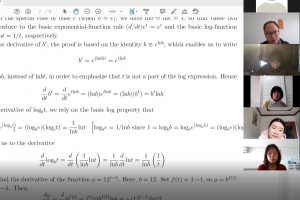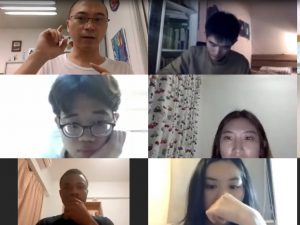Editor’s Note: Since the novel coronavirus outbreak and the consequent suspension of classes to prevent the spread of the virus, distance education has become a hot topic in Macao, Hong Kong, and mainland China. Here at the University of Macau (UM), faculty members have been offering online courses to ensure that students keep learning amid class suspension. In the upcoming My UM articles, we will cover the online courses from different faculties and departments and take a closer look at how faculty members prepare these courses and how they monitor the students’ learning progress.
In this semester, Prof Xu Jianhua, dean and associate professor of the Department of Sociology, Faculty of Social Sciences (FSS), teaches a course in qualitative research methods, and Prof Yang Yibai teaches a course in ‘Advanced Topics in Economic Theory’ and another course in mathematics. Both professors, like other faculty members, have turned to distance teaching and made necessary class arrangements based on the course requirements and teaching objectives to help students quickly adapt to the new mode of learning.
Pre-class Preparation
The course in qualitative research methods is offered to postgraduate students majoring in criminology and criminal Justice. According to Prof Xu Jianhua, the course provides one of the fundamental tools and methodologies to students for constructing research questions and collecting data in the field of social sciences, so it is imperative for students to master the methods. In order to ensure a smooth teaching and learning process, Prof Xu makes thorough preparations before each class. For instance, he uploads lecture notes and weekly extracurricular reading material to UMMoodle and collects students’ pre-class questions online. He also invites his former students who are currently studying overseas to share their research experience with his current students via Zoom. These preparations aim to encourage students to address significant yet hitherto unexplored research topics and to discover the underlying logic and mechanism.
Prof Xu started using online software as an auxiliary teaching tool in 2017 to invite overseas scholars to give online speeches to his students. This semester, he plans to invite some of his former students who are currently studying at Oxford University, Cornell University, and Australian National University to share their research methods and findings with his students. He recommends many world-renowned online academic journals and classic research books, including American Sociological Review, American Journal of Sociology, and The British Journal of Criminology – a journal that has published many of his research papers. He also requires students to submit book reports and related questions every week. ‘Before each class, I would grade their assignments and jot down their questions for class discussion.’
Group Research on Epidemic and Crime
Basically, every student enrolled in this course is required to find an interesting social topic and conduct a group project using qualitative research methods. Prof Xu plans to stick to this arrangement despite the special circumstances in this semester. He divided the students into five groups, with each group carrying out a different research project. But they have all chosen topics related to COVID-19 pneumonia or related crimes, including comparisons of epidemic-related crimes in Hong Kong and Macao, discrimination prompted by the novel coronavirus, and the applications of big data and surveillance systems during the epidemic.
‘I am impressed by the students’ ability to turn the challenges arising from the epidemic into opportunities for learning and research,’ says Prof Xu. ‘Some of my students live in Macao, while others in the mainland, so they have the opportunity to observe how people in different places deal with the epidemic. By sharing their observations in class, we are able to get a much more complete picture of COVID-19 prevention and control practices in Macao and in mainland.’
Exploring Different Data Collection Methods
As a result of the anti-epidemic measures, part of which advises people to avoid going out, most students could only collect data and information at home. How does this affect the research quality? Prof Xu points out that qualitative research methods include observations, interviews, and textual analysis on news reports. One of the advantages of observation and interview is its flexibility – students could observe and interview the subject of their study in their daily lives. For example, one of Prof Xu’s students works at the Macao Customs and he could observe the changes in the flow of people entering and leaving Macao because of the precautionary measures implemented by the Macao government, and such data is useful for the student’s research project. Another example is that students can record what they see and hear when going out to buy daily necessities and use it as raw information. Of course, observations and interviews can also be conducted on social media platforms.
Prof Xu also encourages students to use the electronic database ‘Wiser’ for data collection. The database contains news sourced from more than 1,000 print media and 6,000 online media in Greater China, with daily updates. By using different data collection and research methods, the students can then examine a research topic in a deeper and more comprehensive manner.
Prof Xu requires each group to report their research progress to him every week, and he would guide them through the brainstorming and correction process. Students can also talk to Prof Xu on WeChat about the problems they encountered in their research projects. Also, the shared-screen function allows each group to present their research findings to the entire class and to conduct group discussion. ‘The online teaching tools provided by our university are not only convenient and efficient, but also help facilitate a smooth transition into this new teaching mode,’ he says.
Fostering the Motivation to Learn
Prof Yang Yibai, an expert in economic growth and monetary and fiscal policy studies, teaches two courses this semester, namely a postgraduate course in ‘Advanced Topics in Economic Theory’ and an undergraduate course in mathematics, both of which are conducted via UMMoodle and Zoom. These two courses aim to teach students the techniques to examine economy and to explore economic knowledge from a social-science perspective, in order to prepare them for contributing to the community’s decision-making process in the future. In the past few weeks, Prof Yang would upload teaching materials and assignments to UMMoodle before each class. When explaining complex function derivatives, he would use the whiteboard function to illustrate the reasoning step by step. ‘There is almost no difference between this new mode of education and the traditional face-to-face mode, but of course distance teaching requires more cooperation and self-discipline on the students’ part.’
Prof Yang notes that the change in the mode of instruction presents a big challenge for the instructor because of the lack of instant facial feedback from the students. For this reason, the role of the instructor is shifted towards explaining the course content and providing guidance. ‘Distance education requires more after-class investment of time to digest the content if the students want to perform well in the exam,’ he says. Prof Yang records and uploads every online class to UMMoodle, together with the lecture notes for the entire semester, to make it convenient for students to watch again at any time. Having conducted distance teaching for over a month, Prof Yang finds that students have become more active in asking questions. ‘Most of the time, they approach me through various online platforms and leave their questions,’ he says. ‘This is a good start, and I hope the new teaching mode can help them become better at self-directed learning.’
Each time Prof Yang explains a knowledge point, he uses the chatroom function to collect immediate feedback from the students. He also shares with the students his own learning strategies, one of which is learning by analogy. ‘When I was a student, I usually made analogies to illustrate a concept my teacher had explained in class so as to check whether I truly understood it,’ he says. ‘Meanwhile, as economics students, we often came across very similar concepts, such as “monopoly market” and “monopolistic competitive market”. I would always try my best to figure out the differences between similar concepts in order to deepen my understanding through comparison. I share these learning strategies with the students because I believe they can help students become better learners.’
UMMoodle
Launched in 2008, UMMoodle is an online teaching platform at UM, where students can obtain course-related learning resources including text files, PPTs and video clips. They can also submit assignments and take quizzes on the platform.
Website: https://ummoodle.um.edu.mo/
Learning resources from UM’s Centre for Teaching and Learning EnhancementWebsite: https://go.um.edu.mo/6rjvczah
Related articles:
Distance Education Series: Interviews with FAH Professors
Distance Education Series: Interviews with FLL Professors
Distance Education Series: Interviews with FHS Professors
Distance Education Series: Interviews with FBA Professors
Distance Education Series: Interviews with FST Professors
Distance Education Series: Interviews with FED Professors
Source: My UM E-Version




